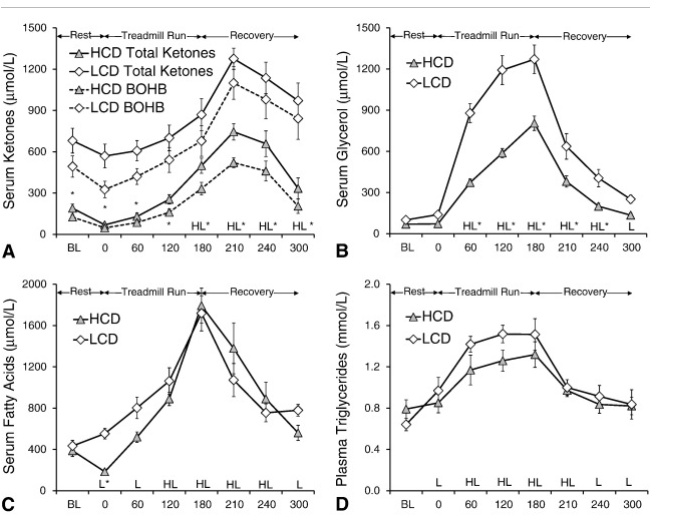Ketosis happens quickly, as soon as your blood sugar drops, whereas fat-adaptation takes weeks.
When you cut your carb intake, your serum insulin drops, along with your serum glucose. As insulin drops, glucagon stimulates two processes in the liver: ketogenesis and gluconeogenesis. The former is the production of ketone bodies, the latter the production of glucose. The body does not require much glucose, but it does require some; so the liver makes what is needed, if we are not getting enough in our diet (in the form of carbohydrate).
Muscle cells can use either glucose or fatty acids for their energy. The problem is that eating too much carbohydrate over too long a period causes damage to the cellular mechanisms that metabolise fatty acids. The cell doesn’t need these mechanisms in order to metabolise glucose, but when we cut our glucose/carbohydrate intake, these mechanisms are not efficient at metabolising fatty acids, until they are repaired. This repair process is what we call “fat-adaptation.” Until the fat-metabolising mechanisms are fully repaired, the muscle cells limp along using ketones. When everything is 100 percent, however, they really prefer to use fatty acids.
If you are an athlete, you will note a decline in your performance during the adaptation period. Eventually, however, your mitochondria heal, new mitochondria are born, and the other cellular mechanisms needed are reactivated. At that point, you are fully fat-adapted, and your muscles will refuse glucose and ketones (sparing them for other cells that can use them), in favour of fatty acids. At this point, people find that their endurance has returned, often to an even higher level than before.
I’m guessing from this that you are a woman. Hormonal regulation takes some time, and many women experience this delay between beginning keto and starting to lose fat. A month is a very short time in which to become fat-adapted; normally it takes between six and eight weeks (for most people).
If you want to get out of ketosis, eat carbohydrate. Your glucagon will drop, your insulin will increase, and your liver will stop making ketones. To get into ketosis, stop eating carbohydrate. Your glucacon will increase, your insulin will drop, and your liver will start making ketones. The changeover in either direction is very quick.
Dr. Phinney has made it sound as though that is what happens, but many people find they return to ketosis fairly quickly. However, we do not recommend dipping in and out of ketosis, regardless of whether you are eating a ketogenic diet to improve your metabolic health or to shed excess stored fat.


